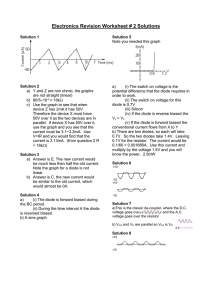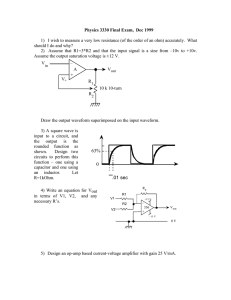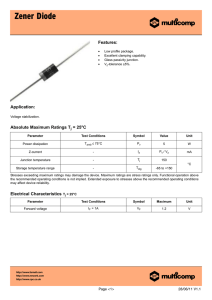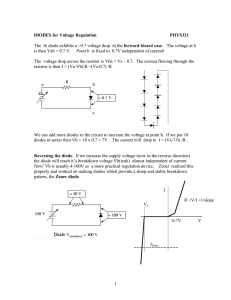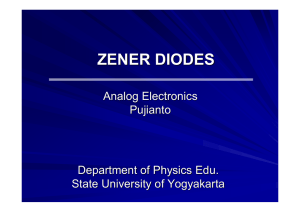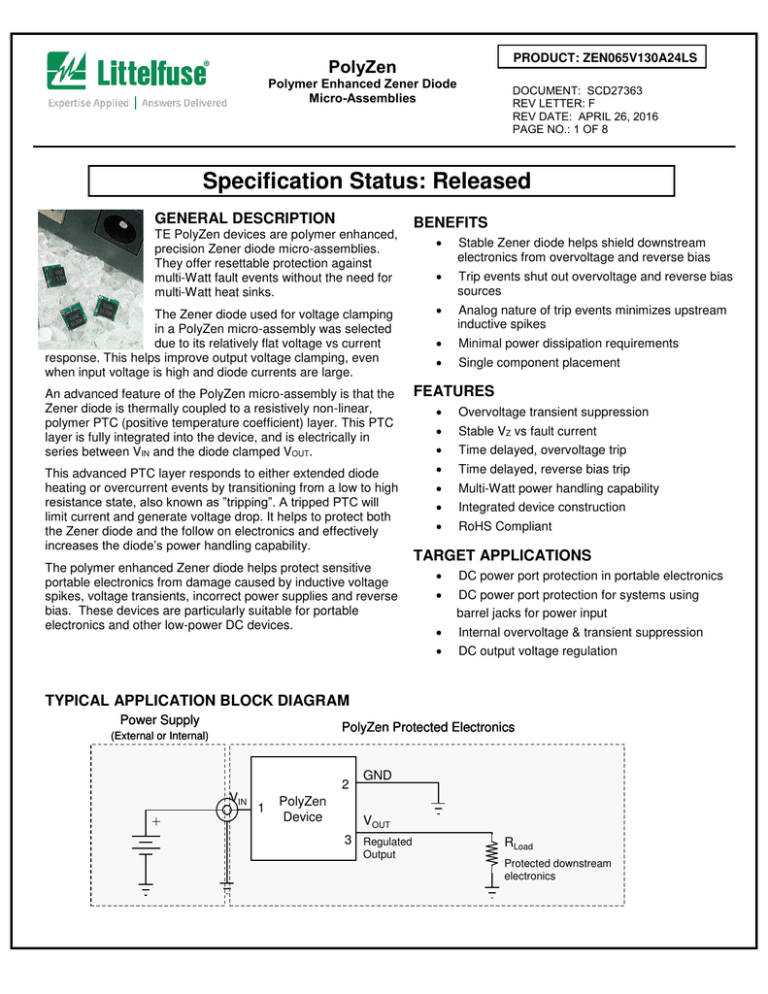
PRODUCT: ZEN065V130A24LS
PolyZen
Polymer Enhanced Zener Diode
Micro-Assemblies
DOCUMENT: SCD27363
REV LETTER: F
REV DATE: APRIL 26, 2016
PAGE NO.: 1 OF 8
Specification Status: Released
GENERAL DESCRIPTION
TE PolyZen devices are polymer enhanced,
precision Zener diode micro-assemblies.
They offer resettable protection against
multi-Watt fault events without the need for
multi-Watt heat sinks.
The Zener diode used for voltage clamping
in a PolyZen micro-assembly was selected
due to its relatively flat voltage vs current
response. This helps improve output voltage clamping, even
when input voltage is high and diode currents are large.
An advanced feature of the PolyZen micro-assembly is that the
Zener diode is thermally coupled to a resistively non-linear,
polymer PTC (positive temperature coefficient) layer. This PTC
layer is fully integrated into the device, and is electrically in
series between VIN and the diode clamped VOUT.
This advanced PTC layer responds to either extended diode
heating or overcurrent events by transitioning from a low to high
resistance state, also known as ”tripping”. A tripped PTC will
limit current and generate voltage drop. It helps to protect both
the Zener diode and the follow on electronics and effectively
increases the diode’s power handling capability.
The polymer enhanced Zener diode helps protect sensitive
portable electronics from damage caused by inductive voltage
spikes, voltage transients, incorrect power supplies and reverse
bias. These devices are particularly suitable for portable
electronics and other low-power DC devices.
BENEFITS
Stable Zener diode helps shield downstream
electronics from overvoltage and reverse bias
Trip events shut out overvoltage and reverse bias
sources
Analog nature of trip events minimizes upstream
inductive spikes
Minimal power dissipation requirements
Single component placement
FEATURES
Overvoltage transient suppression
Time delayed, overvoltage trip
Multi-Watt power handling capability
Stable VZ vs fault current
Time delayed, reverse bias trip
Integrated device construction
RoHS Compliant
TARGET APPLICATIONS
DC power port protection in portable electronics
DC power port protection for systems using
barrel jacks for power input
Internal overvoltage & transient suppression
DC output voltage regulation
TYPICAL APPLICATION BLOCK DIAGRAM
Power Supply
PolyZen Protected Electronics
(External or Internal)
2
VIN
+
1
PolyZen
Device
GND
VOUT
3 Regulated
Output
RLoad
Protected downstream
electronics
PRODUCT: ZEN065V130A24LS
PolyZen
Polymer Enhanced Zener Diode
Micro-Assemblies
DOCUMENT: SCD27363
REV LETTER: F
REV DATE: APRIL 26, 2016
PAGE NO.: 2 OF 8
CONFIGURATION INFORMATION
Pin Configuration (Top View)
Pad Dimensions
2
VIN
0.94 mm
(0.037”)
GND
2.21 mm
(0.087”)
1
3
0.33 mm
(0.013”)
0.94 mm
(0.037”)
VOUT
0.56 mm
(0.022”)
2.88 mm
(0.1135”)
0.56 mm
(0.022”)
PIN DESCRIPTION
Pin Number
1
2
3
Pin Name
VIN
GND
VOUT
Pin Function
VIN. Protected input to Zener diode.
GND
VOUT. Zener regulated voltage output
BLOCK DIAGRAM
Polymer PTC
VIN
VOUT
Zener
Diode
GND
DEFINITION of TERMS
IPTC
IFLT
IOUT
Trip Event
Trip
Endurance
Current flowing through the PTC portion of the
circuit
RMS fault current flowing through the diode
Current flowing out the VOUT pin of the device
A condition where the PTC transitions to a high
resistance state, thereby significantly limiting I PTC
and related currents.
Time the PTC portion of the device remains in a
high resistance state.
IPTC, IHOLD
IOUT
VIN
VOUT
IFLT
GND
PRODUCT: ZEN065V130A24LS
PolyZen
Polymer Enhanced Zener Diode
Micro-Assemblies
DOCUMENT: SCD27363
REV LETTER: F
REV DATE: APRIL 26, 2016
PAGE NO.: 3 OF 8
GENERAL SPECIFICATIONS
Operating Temperature
-40º to +85ºC
Storage Temperature
-40º to +85ºC
TARGET ELECTRICAL CHARACTERISTICS1-3, 11 (Typical unless otherwise specified)
V Z4
(V)
Izt4
(A)
Min
Typ
Max
6.35
6.5
6.65
Note 1:
Note 2:
Note 3:
Note 4:
Note 5:
Note 6:
Note 7:
Note 8:
Note 9:
Note 10:
Note 11:
0.1
IHOLD5
@
Leakage Current
R Typ6
(Ohms)
20ºC
(A)
1.3
VInt Max8
(V)
Test
Voltage
Max
Current
(mA)
6.3
10
0.12
R1Max7
(Ohms)
VINT
Max
(V)
0.16
Tripped Power
Dissipation10
IFLT Max9
Max
Test
Current
(A)
IFLT Max
(A)
Test
Voltage
(V)
Value
(W)
Test
Voltage
(V)
3A
+6
-40
+24
-16V
1.0
24
24V
Electrical characteristics determined at 25ºC unless otherwise specified.
This device is intended for limited fault protection. Repeated trip events or extended trip endurance can degrade the device
and may affect performance to specifications. Performance impact will depend on multiple factors including, but not limited to,
voltage, trip current, trip duration, trip cycles, and circuit design. For details or ratings specific to your application contact TE
Connectivity Circuit Protection directly.
Specifications developed using 1.0 ounce 0.045” wide copper traces on dedicated FR4 test boards. Performance in your
application may vary.
Izt is the current at which Vz is measured (VZ = VOUT). Additional VZ values are available on request.
IHOLD : Maximum steady state IPTC (current entering or exiting the VIN pin of the device) that will not generate a trip event at the
specified temperature. Specification assumes IFLT (current flowing through the Zener diode) is sufficiently low so as to prevent
the diode from acting as a heat source. Testing is conducted with an “open” Zener.
R Typ: Resistance between VIN and VOUT pins during normal operation at room temperature.
R1Max: The maximum resistance between VIN and VOUT pins at room temperature, one hour after 1st trip or after reflow
soldering.
VINT Max: VINT Max relates to the voltage across the PPTC portion of the PolyZen device (VIN-VOUT). VINT Max is defined as
the voltage (VIN-VOUT) at which typical qualification devices (98% devices, 95% confidence) survived at least 100 trip cycles
and 24 hours trip endurance at the specified voltage (VIN-VOUT) and current (IPTC). VINT Max testing is conducted using a
"shorted" load (VOUT = 0V). VINT Max is a survivability rating, not a performance rating.
IFLT Max: IFLT Max relates to the stead state current flowing through the diode portion of the PolyZen device in a fault condition,
prior to a trip event. IFLT Max is defined as the current at which typical qualification devices (12 parts per lot from 3 lots)
survived 100 test cycles. RMS fault currents above IFLT Max may permanently damage the diode portion of the PolyZen
device. Testing is conducted with NO load connected to VOUT, such that IOUT = 0. “Test voltage” is defined as the voltage
between VIN to GND and includes the PolyZen Diode drop. Specification is dependent on the direction of current flow through
the diode. IFLT Max is a survivability rating, not a performance rating.
The power dissipated by the device when in the “tripped” state, as measured on TE test boards (see note 3).
Specifications based on limited qualification data and subject to change.
MECHANICAL DIMMENSIONS
Length
L
Width
W
Height
H
Length
Diode
Height
Diode
Min
3.85 mm
(0.152”)
3.85 mm
(0.152”)
1.4mm
(0.055”)
Ld
-
Hd
-
Offset
O1
-
Offset
O2
-
Typical
4 mm
(0.16”)
4 mm
(0.16”)
1.7 mm
(0.067”)
3.0 mm
(0.118”)
1.0 mm
(0.039”)
0.6 mm
(0.024”)
0.7 mm
(0.028”)
Max
4.15 mm
(0.163")
4.15 mm
(0.163")
2.0 mm
(0.081”)
-
PolyZen
Polymer Enhanced Zener Diode
Micro-Assemblies
SOLDER REFLOW RECOMMENDATIONS:
Classification Reflow Profiles
Profile Feature
Average Ramp-Up Rate (Tsmax to Tp)
Preheat
• Temperature Min (Tsmin)
• Temperature Max (Tsmax)
• Time (tsmin to tsmax)
Time maintained above:
• Temperature (TL)
• Time (tL)
Peak/Classification Temperature
(Tp)
Time within 5 °C of actual Peak
Temperature (tp)
Ramp-Down Rate
Time 25 °C to Peak Temperature
Pb-Free Assembly
3° C/second max.
150 °C
200 °C
60-180 seconds
217 °C
60-150 seconds
260 °C
20-40 seconds
6 °C/second max.
8 minutes max.
PRODUCT: ZEN065V130A24LS
DOCUMENT: SCD27363
REV LETTER: F
REV DATE: APRIL 26, 2016
PAGE NO.: 4 OF 8
PolyZen
Polymer Enhanced Zener Diode
Micro-Assemblies
PRODUCT: ZEN065V130A24LS
DOCUMENT: SCD27363
REV LETTER: F
REV DATE: APRIL 26, 2016
PAGE NO.: 5 OF 8
PACKAGING
Packaging
ZENXXXVXXXAXXLS
Tape & Reel
3,000
Reel Dimensions for PolyZen Devices
Amax = 330
Nmin = 102
W1 = 8.4
W2 = 11.1
Matte Finish These Area
Nmin
Amax
Taped Component Dimensions for PolyZen Devices
Standard Box
15,000
PRODUCT: ZEN065V130A24LS
PolyZen
Polymer Enhanced Zener Diode
Micro-Assemblies
DOCUMENT: SCD27363
REV LETTER: F
REV DATE: APRIL 26, 2016
PAGE NO.: 6 OF 8
Typical response of ZEN065V130A24LS device to
24 V/6 A fault
26
24
22
20
18
V/I
16
VIN
VOUT
IFLT
14
12
10
8
6
4
2
0
0
0.01
0.02
0.03
0.04
0.05
0.06
Time (sec)
0.07
0.08
0.09
0.1
PRODUCT: ZEN065V130A24LS
PolyZen
Polymer Enhanced Zener Diode
Micro-Assemblies
DOCUMENT: SCD27363
REV LETTER: F
REV DATE: APRIL 26, 2016
PAGE NO.: 7 OF 8
Pulse IV (300uSec Pulse)
Pulse IV (300uSec Pulse)
10
6.5
Current: IFLT (A)
Voltage: V OUT (V)
7
6
5.5
ZEN065VxxxAxxLS
5
0
-5
5
ZEN065VxxxAxxLS
1
0.1
0.01
0.001
0.0001
0.00001
-10
-2
0
Current: IFLT (A)
6
8
Time to Trip vs. IFLT RMS (Iout=0)
VOUT Peak vs. IFLT (Iout=0)
7.5
100.0
Time to Trip (sec)
7.4
7.3
7.2
7.1
7.0
6.9
6.8
ZEN065V130A24LS
6.7
ZEN065V130A24LS
10.0
1.0
0.1
6.6
0.0
6.5
0
1
2
3
4
IFLT RMS (A)
5
6
0
7
1
VOUT Peak Vs IFLT RMS (IOUT = 0)
3
4
IFLT RMS (A)
5
6
7
1
ZENxxxV130A24LS
Time To Trip (Sec)
-0.2
2
Time to Trip Vs IFLT RMS (IOUT = 0)
0
VOUT (V)
VOUT Peak (V)
2
4
Voltage: V OUT (V)
-0.4
-0.6
-0.8
-1
ZENxxxV130A24LS
0.1
0.01
0.001
-1.2
-25
-20
-15
-10
IFLT RMS(A)
-5
0
-50
-40
-30
-20
IFLT RMS (A)
-10
0
PRODUCT: ZEN065V130A24LS
PolyZen
Polymer Enhanced Zener Diode
Micro-Assemblies
Temperature Effect on IHold (IFLT = 0)
Time to Trip Vs IPTC RMS (IFLT = 0)
10
2.50
IHold (A)
Time To Trip (Sec)
ZENxxxV130A24LS
2.00
DOCUMENT: SCD27363
REV LETTER: F
REV DATE: APRIL 26, 2016
PAGE NO.: 8 OF 8
1.50
1.00
0.50
0.00
ZENxxxV130A24LS
1
0.1
0.01
0.001
-40
-20
0
20
40
60
80
100
0
10
Ambient Temperature (C)
20
30
IPTC RMS (A)
Temperature Effect on RTyp
0.40
RTyp (Ohms)
ZENxxxV130A24LS
0.30
0.20
0.10
0.00
20
40
60
80
Ambient Temperature (C)
Materials Information
ROHS Compliant
ELV Compliant
Pb-Free
Halogen Free*
HF
* Halogen Free refers to: Br≤900ppm, Cl≤900ppm, Br+Cl≤1500ppm.
© 2008, 2016 Littelfuse Inc. All rights reserved.
40

